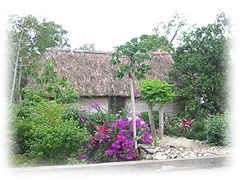Select your city
Language
This section has been created in an effort to introduce you to the modern Maya. We have compiled a number of interviews plus materials contributed to us from Ilvia Larragan Osceola from the University of Florida.
Of course the Mayan region is much larger than the area in which we conducted our interviews. The culture is geographically influenced, but it has been our experience that Mayan culture differs from village to village so any interview process will only identify cultural traits for the close proximity of the interviewee.
We have been told there are a couple thousand Mayan dialects, many still spoken today. Fashion styles can change dramatically between two villages located next to each other. Entire villages are routinely ordered to move and relocated, sometimes hundreds of miles away.
 By in large, many of the villages and small cities located in the Yucatan Peninsula are extremely progressive cultures. In no way could you consider the Peninsula Maya as “third world”. In some areas the traditional palm used to create thatched roofs is becoming protected under law. It is said this is so because of over harvesting of the tree. This is why you see more tin roofs now in the countryside. It is not because the Maya prefer the tin roof in hot climatic zones but because tourist facilities along the Riviera have over exploited this resource and even driven the price up making it out of reach for many families to use.
By in large, many of the villages and small cities located in the Yucatan Peninsula are extremely progressive cultures. In no way could you consider the Peninsula Maya as “third world”. In some areas the traditional palm used to create thatched roofs is becoming protected under law. It is said this is so because of over harvesting of the tree. This is why you see more tin roofs now in the countryside. It is not because the Maya prefer the tin roof in hot climatic zones but because tourist facilities along the Riviera have over exploited this resource and even driven the price up making it out of reach for many families to use.
In the rain forests of Mexico the Maya do prefer tin because it lasts longer. Many families live in houses similier in nature with the traditional Mayan style but built with block and morter with Spanish and Mexican styles assimilated into the architecture.
Food specialties change from village to village; economic prosperity, size and a host of other influences mold each village’s culture.
Below are interviews complied over the Northern Interior of the Yucatan Peninsula.
Click on the name to meet the person!
|
|
|
|
|
|
|
|
|
Introduction
This project explores informal education in the Yucatan; and socialization processes. Through observations, interviews, and interactions a University of Florida team investigated how knowledge is transmitted inter-generationally in non-institutional arenas.
Mayan Women and Socialzation
Many women in Mexico receive different types of formal education. However, from a very young age women in the Yucatan are also informally socialized into what it means to be a woman in this society.
Merida Hammock Vendor
Sr. Para went on in detail about how he has a daughter that he loves very much and that he is unhappy that his daughter is ashamed of him because he is a hammock seller.
Merida Candy Vendor
During the summer, Miguel and many other young people from Chiapas live together in a rented room.
Ticul Hammock Making
We quickly learned that during this time funds were scarce and hardly anyone was working because there was no more ¨conos¨ or cone shaped threads with which to make the hammocks.
Ticul Shoemaking
The shoemakers´ workdays range from seven to ten hours a day. Many of the shoemakers have been there for years.
Ticul Pottery Making
Many young people in Yucatan pueblos become socialized into their parents’ work world as soon as they are old enough to wander around a shop.
Ticul Sculpture
The primary workplace is a thatched-roof,wood-and-stucco protrusion from the side of the house.